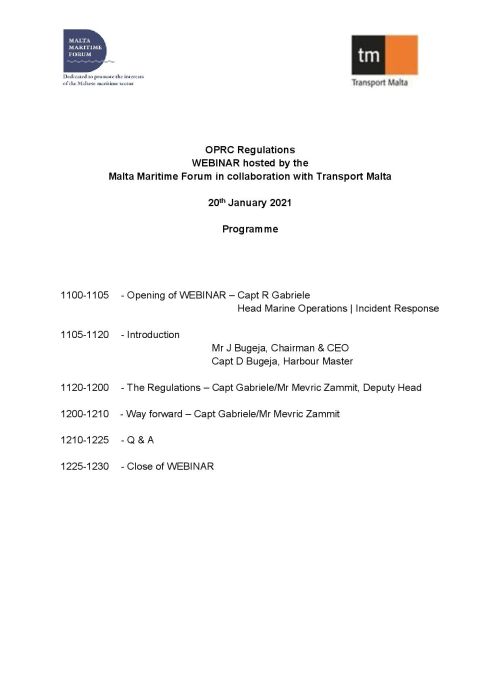Dr Ann Fenech, Ms. Rowena Grima, Dr Lara Saguna Axiaq and Dr Stephanie Farrugia recently attended a webinar organised by the Authority for Transport in Malta ("TM") together with the Malta Maritime Forum to introduce the new Oil and Hazardous and Noxious Substances Pollution Preparedness, Response and Co-operation Regulations ("OPRC Regulation") to the different players in the local shipping industry. This was a good way for TM to present and explain the key features as well as the Authority's goals and expectations from local operators moving forward.
The aim of the OPRC Regulation is two fold.
Firstly, to transpose and provide the regulatory framework for implementing the International Convention on Oil Pollution Preparedness, Response and Co-operation signed in London on 30th November, 1990 (known as OPRC Convention) and the Protocol of 2000 to the OPRC Convention relating to Pollution Incidents by Hazardous and Noxious Substances signed in London on 15th March, 2000 (known as OPRC-HNS Protocol). As the legislative titles imply, both aim to ensure that systems are in place for readiness to respond to pollution incidents and that on a global scale there is a framework for States to co-operate with each other in combating major marine pollution incidents or threats thereof.
Secondly, the OPRC Regulation provides for the applicability of the National Marine Pollution Contingency Plan prepared by TM, as well as the requirment for marine terminals, marine facilities and ports to have marine pollution response emergency plans in place setting out arrangements for responding to pollution incidents and preventing or minimising harmful effects therefrom.
As the National Competent Authority, TM noted that it's functions, amonst others, shall be to advise and consult with operators of marine terminals and facilities in the development, implementation and updating of their pollution emergency plans as well as to approve the said plans. They shall furthermore have the power to organise training and drills in pollution emergency and response for the personnel of marine terminals and marine facilities, even to co ordinate such training on a national level.
A predominant feauture emanating from the OPRC Regulation is the requirment for marine terminals, marine facilities and Ports to have in place a minium level first-aid pollution response equipment, dependent on the risk assessment of the operator. Naturally, each operator's risk assessement will differ depending on the risks pertaining to the operators activities and the ways in which each operator plans to mitigate such risks. It was also noted that the equipment can be shared between operators, if agreed to by the operators and this making sense logistically in light of Malta's size and the geographic proximity of local marine terminals, facilities and ports.
Local operators already have good practices in place however TM have strongly encouraged the industry to familairse themselves with these new requirements in the OPRC Regulation, to take stock of their status of preparedness and to develop, implement and maintain a pollution emergency plan or update their plans, as the case may be. The timings laid out in the OPRC Regulation are for the plans to be submitted to TM within 12 months from the coming into force of the Regualtion, provided that where a marine terminal or facility comes into operation after the coming into force of the Regulation, the plans must be prepared and submitted to TM at least two months before starting operations.
In the spirit of the law, TM expressed their willingness to support local operators with the setting up of their contingency plans and risk assessments and have also informed that they shall be issuing a guidance document in the first quarter of 2021.
